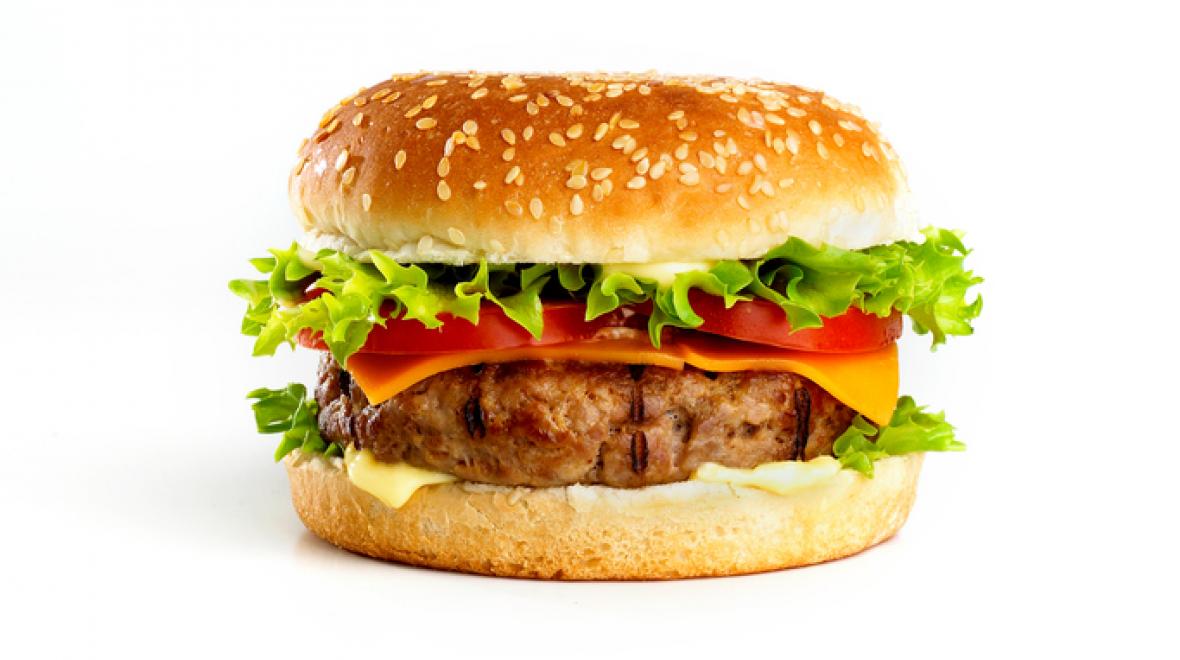
As a child, I loved United Nations Day. This annual celebration at my school in Singapore recognized the hundreds of different cultures of my fellow students. There were food vendors and dance performances, and every year without fail, I’d smell them: hamburgers at the American stall.
I’m a practicing Hindu, and while there are different interpretations of the religion, most practicing Hindus abstain from consuming cow meat — a.k.a. no hamburgers. Aside from United Nations Day, it was easy to avoid burgers while growing up in Singapore. Five percent of the population is Hindu (compared to America’s 0.6 percent) and the country’s multicultural cuisine offers plenty of non-beef options. But here in the U.S., hamburgers are everywhere.
So, should I let my American-born son eat them?
Veer, my son, just turned 1. He’s trying food but nowhere close to eating his first burger. Still, the decisions my husband, Paras, and I make now will influence all the food he eats, at least for the next decade or so.
At home, this hasn’t been an issue. I just don’t cook beef. But as I recently filled out Veer’s enrollment form for daycare, I took a big pause when Paras and I came to the “food allergies or restrictions” section.
“NO BEEF,” I was ready to decisively write.
Then, I hesitated.
“Is this the right decision? We’re not super religious… and beef is present in American food,” I said to Paras.
“As long as we don’t cook it at home, maybe it’s fine if he tries it at daycare,” he replied, unsure.
“But then, will he still identify as a Hindu, like we do?” I wondered aloud.
My parents didn’t face this problem. Neither did Paras’. He grew up in India where beef is extremely difficult to find (McDonald’s doesn’t sell cheeseburgers there). And there wasn’t any need for discussion on the issue between my Indian-born parents.
Eating food from different cultures feels particularly American to me.
But I’m a millennial parent living in America; taking an inflexible stance on food habits feels outdated to me. Veer’s got an opinion, too. He eats fruit with gusto but hates steamed broccoli. As he grows, he may not take well to the idea of being “denied” something he wants to eat.
The same goes for religion. Paras and I grew up identifying with Hinduism without question. It’s just what our households did. So by banning beef will we inherently be forcing our religion onto our son? We plan to raise him as a Hindu, but as he ages, we want to let him determine what to practice (or not, seeing as more Americans than ever identify as atheist). By imposing a blanket ban on beef, are we denying Veer an opportunity to try things that may be linked to his American identity?
I got my answers over a meal. While eating lunch at my favorite Vietnamese restaurant in the International District, I thought about the first time I tried pho. I — born and raised in Southeast Asia — was in Atlanta the first time I ever had Vietnamese food. And Korean food? That was sitting elbow-to-elbow over a steaming bowl of dolsot bibimbap in Manhattan’s Koreatown. The same goes for Mexican food. I’d never had it until I moved to the United States.
Eating food from different cultures feels particularly American to me. In time, I envision that "American" cuisine will stand for more burgers and steaks. It’ll reflect dishes from all over the world — a reality I suspect will only become more likely as Veer grows up.
So someday, Veer may eat beef. Or, at least, Paras and I won’t keep him from it. In the future, our son may or may not identify as Hindu, but that doesn’t mean we shouldn’t teach him about our religion while he’s still willing and able to learn. While living in the U.S., I’ve learned that there’s no “absolute” way to live and I want Veer to feel that, too.











